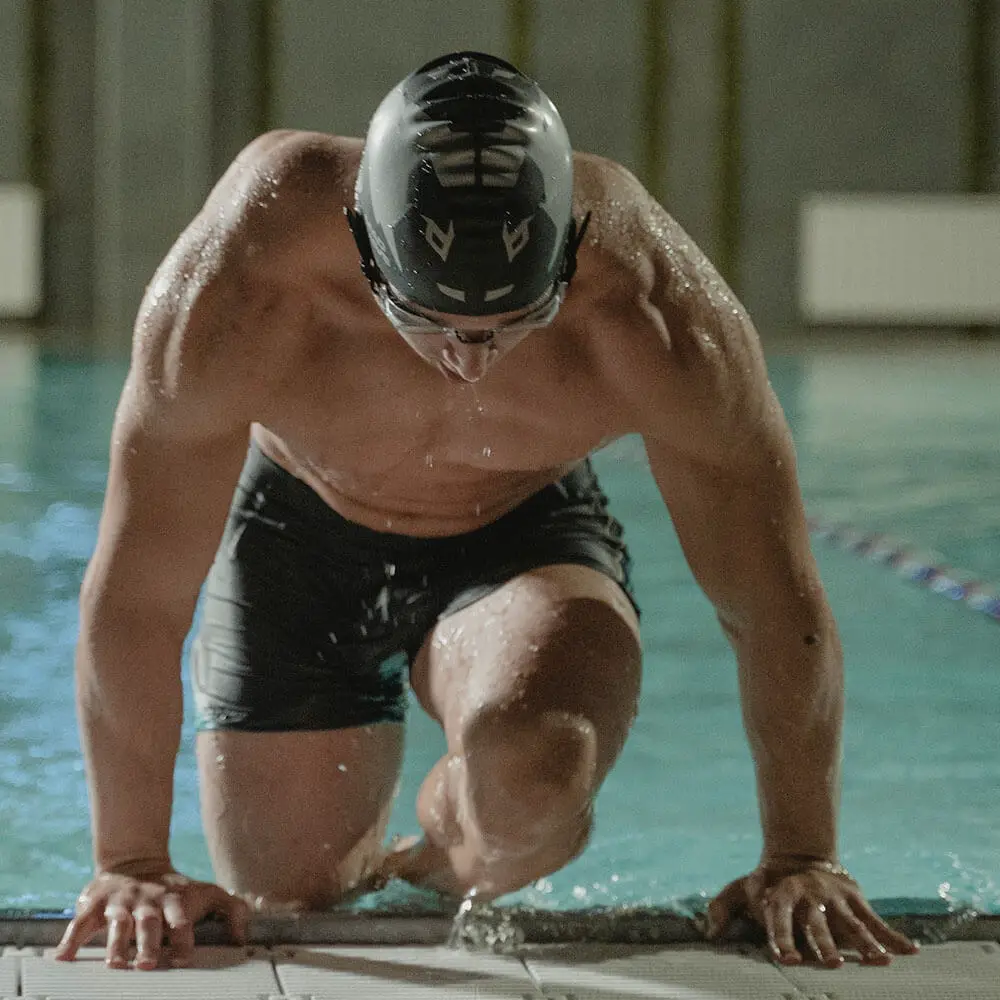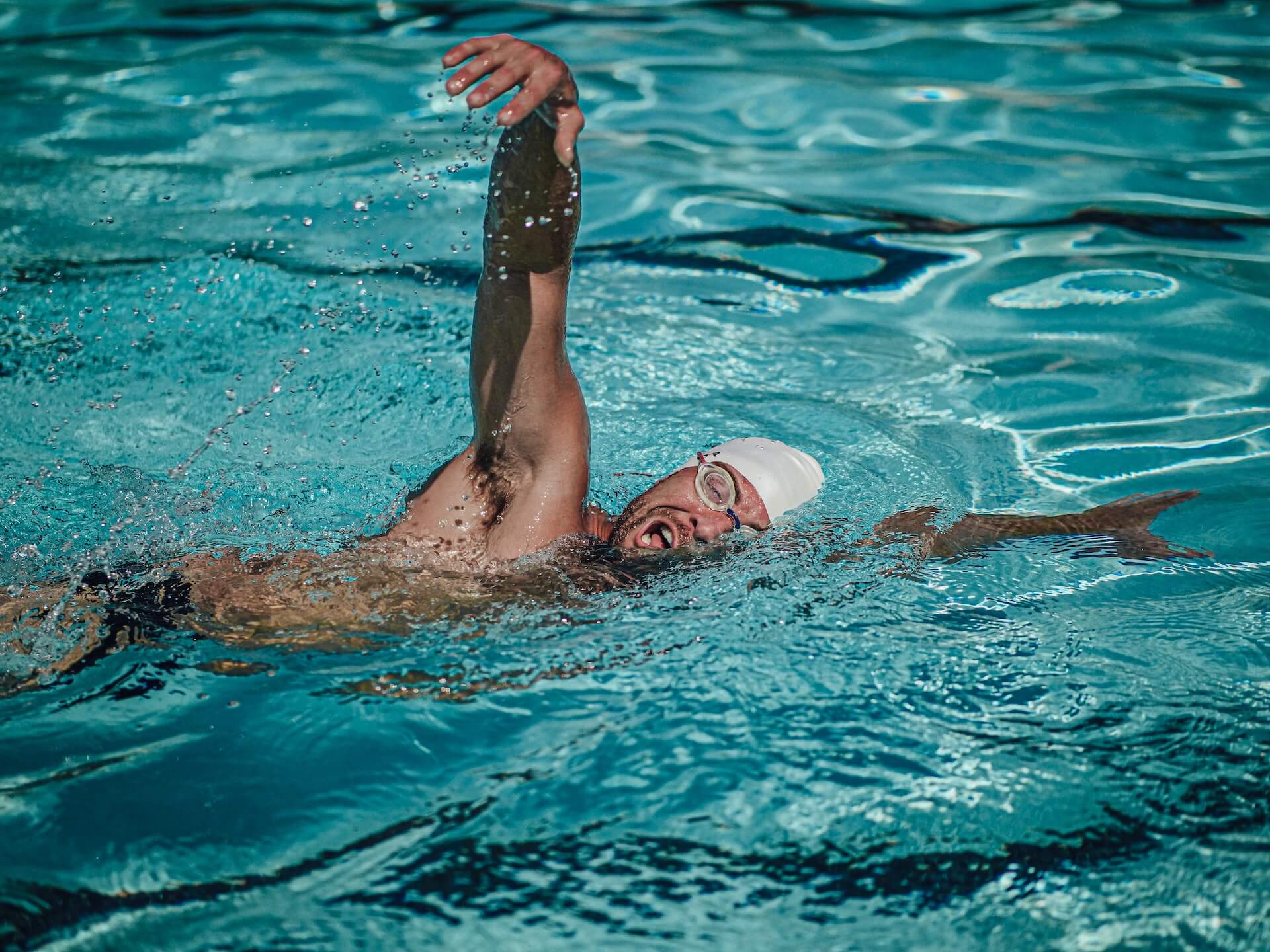The idea of getting a total body workout while enjoying the cool, refreshing water is certainly enticing. You can get a lot of bang for your buck when it comes to the number of health benefits for the time spent at a swimming pool. As effective as swimming is, can swimming be your only exercise?

Swimming can be your only exercise because it works your entire body, including your heart, muscles, and joints. It can also improve your flexibility, burn calories, and reduce stress levels. However, swimming alone is not enough if you want to build big muscles or train for a triathlon unless you do some specialized training.
So, whether you’re searching for an effective workout that’s easy on your joints or just seeking a fun and refreshing way to stay active, swimming might be the perfect exercise for you. Keep reading on to learn how it can help you lose weight, build muscle, and improve your overall health.
Can Swimming Be Your Only Exercise for Weight Loss?

Understanding the Caloric Burn of Swimming
Swimming is a fantastic low-impact exercise that can help you burn calories and work towards weight loss. As a total body workout, it engages both your upper and lower body muscles, raising your heart rate and allowing you to burn a significant amount of calories.
Depending on the intensity of your workout, your weight, fitness level, and the stroke you use, you can burn between 400 to 800 calories per hour. That’s equivalent to a brisk 60-minute jog or a high-intensity gym session.
As an aerobic exercise, swimming can help improve your endurance and cardiovascular fitness.
Comparing Swimming to Other Cardio Exercises for Weight Loss
When comparing swimming to other cardio workouts, it holds its own as an effective tool for weight loss. It burns approximately the same amount of calories per hour as running or cycling does, but swimming provides the added benefit of being a low-impact exercise, meaning it’s easier on your joints and a great option for people who may have injuries or joint issues.
Swimming can also help improve your breathing control and build strength in your muscles, since you must overcome the water resistance to move around. This versatility makes it an appealing choice for your main cardio workout.
Implementing a Consistent Swimming Routine for Weight Loss
To make swimming your primary exercise for weight loss, consistency is crucial. Develop a routine that suits your schedule and preferences, whether that means swimming laps in a pool before work, incorporating interval training, or leisurely swimming a few times a week.
It’s important that you enjoy the process and gradually increase the duration or intensity of your swims to keep challenging yourself. But for now, just focus on being consistent.
For effective weight loss with swimming, aim for at least 150 minutes of moderate-intensity or 75 minutes of vigorous-intensity swimming per week, coupled with a balanced diet. Try picking at least 3-4 days of the week where you can swim laps in the pool for at least 30-60 minutes.
Swim any stroke you like, but most people prefer freestyle and that is very solid when it comes to burning calories. Butterfly stroke burns the most calories per unit of time, but it’s also very difficult to perform, and freestyle is not much lower in terms of calories burned, plus it’s much easier to do.
Can Swimming Be Your Only Exercise for Building Muscle?

Swimming and Muscle Groups: A Comprehensive Breakdown
Swimming is an excellent exercise that works on multiple muscle groups simultaneously. When you swim, your upper body, lower body, and core muscles are all engaged in various ways. For example, the breaststroke and backstroke primarily target your upper body muscles, such as your chest, shoulders, and back, while also engaging your leg muscles for kicks.
Not only can swimming help you maintain overall physical fitness, but with proper technique and form, it can also provide an effective strength-building workout. Most swimming strokes involve some level of resistance between your body and the water, which aids in muscle development.
Limitations of Swimming for Muscle Hypertrophy
Although swimming offers resistance, it may not provide the same level of muscle hypertrophy as traditional strength training exercises like weightlifting. The resistance provided by water is generally less than the resistance you’d encounter when training with weights.
When it comes to weightlifting, it’s much easier to increase the weight by adding more plates to the bar, but when it comes to swimming the water resistance stays constant, so you will plateau quickly when it comes to building muscle.
Moreover, swimming tends to be more focused on endurance rather than building strength. While it’s an excellent cardiovascular exercise, it might not be the most effective option for individuals looking to significantly increase muscle mass and strength.
However, it can help you lose weight which can reveal the muscles hidden under your fat. If you really want those muscles to bulge out, then consider swimming and going to the gym on the same day, if you have the energy for it.
Strategies to Maximize Muscle Building in Swimming
To make the most of your swimming workouts and promote muscle growth, try implementing the following strategies:
- Focus on form and technique: Ensure that you are using the correct form and technique while swimming to engage the right muscle groups and maximize strength-building potential.
- Increase resistance: Use swimming accessories like paddles or fins to increase water resistance and challenge your muscles further during your workout.
- Vary your strokes: Switch between different types of swimming strokes during your session to target various muscle groups and avoid muscle imbalances.
- Incorporate strength training: Complement your swimming routine with strength training exercises like weightlifting or resistance band workouts to promote muscle hypertrophy.
Consider hiring a swim coach, as they can provide additional guidance on how to improve your swimming form and help you tailor your workouts for optimal muscle-building results.
Can Swimming Be Your Only Exercise for Overall Health?

Cardiovascular Benefits of Regular Swimming
Swimming can be a fantastic form of exercise for overall health, thanks in part to its many cardiovascular benefits. Being a low-impact, full-body workout, swimming helps increase your heart rate and improve circulation, which can ultimately lead to a more efficient heart and a reduced risk of heart disease.
Regular swimming sessions can also increase your lung capacity and may even be beneficial for people with asthma. Moreover, consistent swimming has been shown to lower blood pressure and improve overall cardiovascular health.
How Swimming Enhances Flexibility and Posture
Swimming works all of your major muscle groups, encouraging a balanced and coordinated physical development. By engaging and stretching your muscles during each stroke, you’ll find that swimming can improve your flexibility and even help with posture. This combination of increased strength and flexibility can lead to a lower risk of joint pain or arthritis.
In addition to supporting joint health, swimming may help prevent injury. Since it’s a low-impact exercise, there’s less strain on your joints than in other forms of exercise, such as running. This makes swimming a great option for maintaining fitness levels while recovering from an injury or for those looking to avoid putting excess pressure on their joints.
Mental Health Benefits of Swimming
Finally, let’s not overlook the potential mental health benefits swimming can offer. Engaging in regular swimming sessions can be a great way to relieve stress and boost overall well-being.
The feel of water surrounding your body provides a sense of calm, and the rhythmic movement of swimming strokes can help put your mind at ease, enabling you to better manage stress and anxiety. In fact, swimming has been shown to be beneficial for mental health due to its soothing and relaxing effects.
The Verdict
Depending on your specific goals, swimming may be the only exercise you need in your life. If your goal is to lose weight, improve your cardiovascular endurance, and get healthier overall, swimming alone is enough.
However, if your goals are much loftier, such as to train for a triathlon or to pack on large amounts of muscle, then unfortunately swimming alone is not adequate. You will need to also go to the gym and increase the intensity of your training significantly to achieve the most optimal results.
Sources:
- https://www.healthline.com/health/benefits-of-swimming
- https://www.healthline.com/health/fitness-exercise/swimming-is-the-best-workout-you-need-to-do
- https://www.cdc.gov/healthywater/swimming/swimmers/health_benefits_water_exercise.html
- https://www.goodhousekeeping.com/health/fitness/a43331040/swimming-benefits/
- https://www.health.harvard.edu/diet-and-weight-loss/calories-burned-in-30-minutes-for-people-of-three-different-weights

